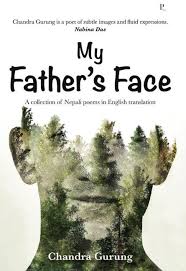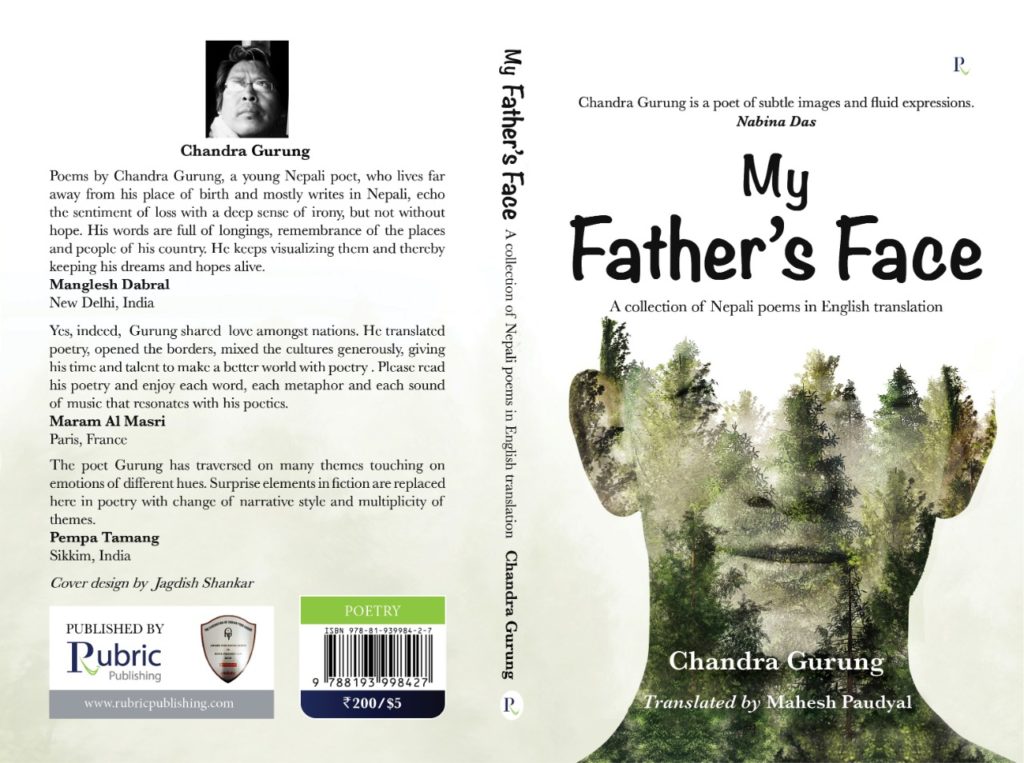Chandra Gurung is an innovative Nepali poet and translator. His poems are full of buoyancy and imagery. He has depicted maladies of modern man and put across the passions and sensitivities of contemporary life as well. The poetic style is elaborated and effectual. Metaphor and simile are in abundance in his poems which heighten the beauty and charm of his free verse, the mild expression of melancholy, diaspora and existentialism is also manifested with precision. The anthology has 47 poems on diverse shades of human immoderation and commotion.

The anthology opens with a beautiful poem entitled My Father’s Face that describes the struggle and grandeur of the father-figure. According to the poet Chandra, a father’s contribution and the role is incomparable in children’s life. He faces all thick and thin of daily life without any gestures of grumble and protest. He never shows any signs of the complaint. The poet feels pleasure being addressed that he looks like his father. Joy Unbound has a very common idea but the imagery and the turn of phrase are very unique. Personification is the major poetic device used by the poet to explain the sweetness and taste of success. This Evening is an address poem where the poet asserts that one should not be retrospective and nostalgic all the time. The grimy past is like a shackle that does not allow a person to progress in life. It brings stagnation and hoard of torment. The poet explains that moving on is the basic law of this perpetual journey of life. We should dare to seed our dreams and passions again in the soil of optimism to sprout. We must never give up hope. Life Sings on is a squeal of This Evening in sense of its message and conceits. The poet explains that nature is at its move then why we should halt after wreck life “keeps on singing a song” then why not we croon.
The Rain Showers Torrents of Flames is full of alliteration and metaphor. The repetition of “Pitter-patter” in the opening line of each stanza; and “Keep Flowing” in the closing stanza of the poem make the poem harmonious. The title of the poem speaks about the fundamental notion of the poem that is sanguinity. As You Stooped is again an address poem where the poet complaints that we are swindler in our behaviour and we lack originality in our conduct. Conceit is a haiku poem that has an apathetic tone and incongruity in the subject matter. ‘Dark-sun’ is an example of antithesis. Assassination of God gives the expression of the crucifixion of God but symbolically it talks about the righteousness and virtues that have lost their place in our hearts. Humankind is at menace. An Old Lamp Post is a symbolical poem. Personification and simile are the main poetic tools used to express the whole conception. The old lamp stands and witnesses altering phenomenon. We lack leadership and guidance to reinstate. Both the poems Nations, Bones and the Dogs and Face of the Nation express the terror, malpractices and frights that have made the nation (Nepal) pitiable and scrawny.
Ill Omens presents the internal disturbance that has been produced by the rioters. These insurgences and riots are a threat to the peace and progress of the nation. Some Poems on Nation, the Nation-1, the Nation-2 and Patriotism share the same assessment and annoyance prevalent in the country. The nation has been snubbed by disorder, bribery, discrimination and anarchy. Patriotism is a wonderful poem where the poet has become the mouthpiece of a country-solider to express his emotions and feelings of being a soldier. It’s Pretty Cold and Party Workers that records the political scenario of the country in which the poet explains how the common man fooled by the politicians and the leaders alike.
Lovely Moon is a beautiful poem, which records the moon in exquisiteness. The poet records the diminutive detail of its movement. The closing couplet is addressed to the beloved. In A Shower of Memories, there is ‘a deluge of reminiscence’. The poet feels nostalgic and retrospective. Simile and Metaphor is in abundance and aptly dealt in. Fragrance of Love is another striking poem on the matter of love and buoyancy. The poet assumes that the time will come when everything becomes free of sorrow and agony and man could be at peace and amity. That Window is an outlet to the overpowered emotions and feelings of the poet that hops up to the surface after seeing the beloved-one and changes the whole scenario around.
Trust is an address poem in which the poet seeks the company of someone to rejoice with on the proviso of trust. There Is a Defeat, Somewhere makes us sentient to find the flaws and defects that lie with us. All is Well is a poem where the poet Chandra claims that everything seems fine. Society has no trifling hassles. But the poem ends with a rhetoric-question that leaves us to think over. When We Meet These Days exhibits the futility and vanity of modern life. The personality of a man is like an onion that has many layers but the inner core is missing and empty. Smiles are fake and fabricated. Poet and Poetry is a piece of literary magnitude. The poet composes a poem on nature. He claims that ‘no flower of intimacy blooms with fragrance’.
Small Children at Play portrays the charm and engagement in recreation of the childhood. In The Antique Hill, the poet explains the vistas and panoramic scenes of hilltop. Life Keeps Writing Poems is a haiku poem. It has personification, metaphor and simile in a fine blend. The poet assumes that one day life departs and leaves sweet memories behind. Peace explains how life restores to peace and happiness after a dodgy war that wrecks human life. In Incomplete Victory, the poet explains that no victory is complete in the true sense because war brings no happiness for any. Even the great victors in the world have found futility and hollowness in their triumph. They also lose their kiths and kins at the cost of victory. Land of the Boatman reflects the paradoxical reverberation of life and social values. Dil Bahadur Majhi an old boatman observes the stillness and coldness of soul emotions. Vehicle in the Village expresses the dreams and desires of the poet after seeing the coming of the vehicle in the village. It brings happiness to all. But the charms fade very soon as everything has pros and cons. The vehicle spreads the dust all over the village.
An Untouchable Man puts across the stigma of untouchability and shows the victimisation and persecution of feeble and hapless. In Mother Tongue, the poet explains that words change the expression of love, feelings and emotions. Prosperity explains that the basic needs could be fulfilled with ease, but the human heart’s greed has changed the values of these things. The Last Earth describes the beautiful sun and natural magnificence. Mountains: A Widowed Portrait is a metaphoric poem. The poet states that the mountain seems like a widow when it is full of snow around, but as the sun rises, the whole outlook of the mountain changes to a bride, and the sky appears to embrace her with love.
My Father’s Face is an anthology that fabricates poems from all walks of human life. They are decorated with figures of speech. Elocution and diction are very impressive.

Chandra Gurung was born in a remote village in the district of Gorkha in Nepal. After college education, he worked as a teacher for some years in the private boarding schools in Kathmandu, the capital of Nepal. He is currently working in The Kingdom of Bahrain.
He has a deep passion for poetry and writes poems in the Nepali language. He is also active as a translator of poems from English, Arabic and Hindi into Nepali. My Father’s Face from Rubric Publishing, New Delhi is his second poetry collection. His first poetry collection in Nepali was published in 2007. His works have been published in several print and online publications.
